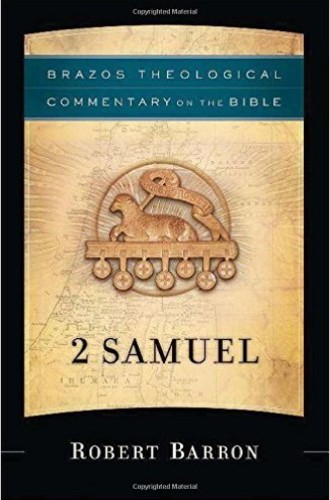2 Samuel by Robert Barron
Although I uphold the pedagogical and corrective virtues of biblical commentaries, I always tell young clergy and my students, “There’s no sermon in there.” But in Robert Barron’s new volume on 2 Samuel in the Brazos series, there may actually be quite a few sermons.
The Brazos project is intriguing: ask theologians to exposit books of the Bible and see what unfolds. The results are mixed, but generally thoughtful and occasionally profound. The Old Testament volumes are of special interest. What series editor R. R. Reno does with Genesis and what Ephraim Radner does with Leviticus, for example, boggles the mind. Their theological agility and depth of specifically Christian reflection on texts from the Torah fill me with envy, and with a craving to preach as profoundly as possible from the Old Testament.
Read our latest issue or browse back issues.
Barron’s achievement is crazy good. It would be trite and yet true to say that he writes well or that his commentary reads like a novel. I kept jotting the word eloquent in the margins. Writers bear the same responsibility preachers do: it’s up to us to preserve the glories of the language, to keep words alive, to remind others that elegance of expression is possible and that it matters. Our business, after all, is the Word. Barron, who serves as the rector/president of Mundelein Seminary University of St. Mary of the Lake, is at the head of his class.
But what is good writing? We tend to think there exists some clever artistry with words, and maybe there is. Mostly, though, good writing is the manifestation of clear thinking, and Barron thinks clearly—and broadly when he reads the saga of David’s family recorded in 2 Samuel, with its episodes that are less theological than political and emotional, that involve more family strife and drama than religious instruction.
Barron’s reservoir of allusion is impressive, and his helpful references to history and literature are more than adornment. David is “a forerunner of Lincoln or Churchill” who demonstrates that “leadership is a complex, multifaceted skill involving management and vision but also the capacity to engage the imaginations of those to be led.” Ahithophel’s suicide is “Cato-like.” David’s henchmen picked up on a small comment he made and fetched him water, “somewhat in the spirit of the courtiers of Henry II.” And I have to admit I reimagined the reality of 2 Samuel 18 when Barron illustrated the way the thicket of the forest claimed more victims than the sword, “reminiscent of descriptions of the Wilderness Campaign during the American Civil War.”
I am grateful that most of the commentaries I own zoom in on textual minutiae. Barron exhibits enough of this sort of scholarship, but he doesn’t get bogged down anywhere. Instead he helps readers to see the broader story. His grasp of the complex development of David’s character is unsurpassed. For example, his recognition of a “declension in the manner in which David responds to the deaths of those close to him” left me dazed and delighted. When David was a young man, he concocted a poetic elegy to Saul and Jonathan; later he composed something shorter and less lyrical for Abner; he responded with greater brevity and somberness to the death of Bathsheba’s child; and he was reduced to mere sobbing and groaning when he lamented “Absalom, Absalom, my son, my son, Absalom.” This notion of successive deaths wearing David down: Did the writers of 2 Samuel even notice such a thing, which seems plainly to be there?
This question has fascinated me since I first ruminated on C. S. Lewis’s suggestion that “an author doesn’t necessarily understand the meaning of his own story better than anyone else.” To say anything robustly Christian about any Old Testament passage, you have to reach beyond the author’s intent. The scholarly warrant, at least for my generation, was issued by Brevard Childs, with his duly famous notion of canonical criticism. But most examples of those trying their hand at canonical reflection are restrained, maybe too careful. Barron is daring, even playful, and I have to admit that I love the strategy he employs as he makes his move from a Bronze Age story to the Christian dispensation.
Commenting on the contrast between David’s magnanimity toward Saul and Saul’s pettiness, for example, Barron avers, “It is impossible for Christians to miss the link to Jesus,” who nonviolently engaged his foes. David was 30 when he united the tribes under his leadership. “The Christian reader will recognize a link to Christ,” Barron writes. Still, he never overdefines this link. Tantalizing and suggestive more than definitive, Barron teases, hints, and helps us read the New Testament more richly: on Palm Sunday, Jesus entered Jerusalem to the sound of Hosannas as the crowd dubbed the event the coming of their ancestor David once more. Barron asks: “Who could miss the association with David’s own dancing entry into his capital city?”
Over and over Barron undogmatically says that Christians see in David “the most compelling anticipation of Jesus.” He admits that this sort of move is always “hermeneutically dangerous,” and at times he rejects traditional allegorical or christological readings of passages. Occasionally he risks supersessionism and veers into excess. In 2 Samuel 23, David sings of his “house,” which fell apart. Barron writes: “The only house that fulfills the expectation expressed here is the house of Christ’s body, which proves across time that the God of Israel is eternally faithful to his promises.”
Even if you prefer non-Christocentric readings, Barron is masterful with these texts. On the well-worn episode of David and Bathsheba, Barron’s acute psychological insight is riveting. David’s view from the roof, gazing down, “is a parody of God’s providential presidency over the whole of creation.” David seizes, “Adam-like, the prerogatives of divinity.” Barron sees resemblances between Bathsheba and Eve and explores David’s response to Nathan with help from Gregory the Great and Chrysostom. Tying David’s remorse to Psalm 51 and Romans 7, Barron wisely observes that David “does not need a program of ethical renewal; he needs to be re-created.”
In Barron’s capable hands, what is made of Michal’s aversion to David’s dancing? “One can only begin to imagine the texture of her feelings at this point in the narrative. She had witnessed the deaths of her father and brother and the fall of Saul’s kingdom; her husband had gone on to marry several other women and fathered children with them while she remained childless.” Is she resentful? Angry? Wounded as she gazes through her window? “From her height, she regards David with the same haughty disdain that her father once showed to his rival.”
David’s minimal clothing has a clear sexual connotation, foreshadowing future disasters resulting from his sexual imprudence. His nakedness also “harkens back to the garden before the fall.” Barron defends David as an enthusiastic worshiper of God, contrasting him with Michal, whom Barron calls “a sort of ancient Israelite version of Immanuel Kant, for whom religion was entirely a matter of morality, rationally construed.” Yet Barron rescues her: “The moralizing Michal might be read as the prophetic side of religion and the dancing David as the priestly side of religion, which refuses to be constrained by reason alone.” This is rich fare.
And finally, Barron’s treatment of chapter 7 is brilliant. David wants to build a temple but is thwarted by God. Dipping into Chronicles, Barron concurs with its withering critique that David had shed too much blood to be the one to erect the temple this “appears to refute those who say that the God of the Old Testament is ruthlessly bloodthirsty.”
Pondering God’s no to David’s good intentions, Barron serves up a paragraph that could be pasted into many a sermon on many a text:
A person’s plan might be bold, beautiful, magnanimous and popular but still not be God’s plan. A person’s ambition might be admirable and selfless but still not be congruent with God’s ambition. Our lives are not about us. God’s plans for us are always greater, more expansive, and more life-giving than our plans for ourselves.
As a preacher under weekly pressure to cobble a sermon together, I find myself loving Barron and his book. I want to continue to ponder the way he hints at Christian allusions and to find more danger zones. If I could talk a few Jewish friends into reading his book with me, I would learn so very much; without Barron’s boisterous and risky readings, even that exercise would be duller.






